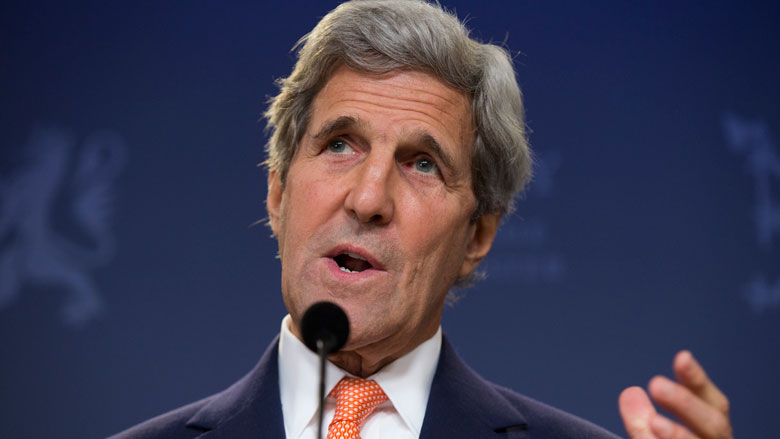After Trump’s Taiwan call, Kerry declines to comment
By Patrick Goodenough | December 5, 2016, 4:23 EST
 (AP Photo/Evan Vucci, Pool)
(AP Photo/Evan Vucci, Pool) (CNSNews.com) – As China continues to bristle over a phone conversation between President-elect Donald Trump and the president of Taiwan, Secretary of State John Kerry on Sunday declined to comment when asked whether he was concerned Trump could spark an “international crisis” before even taking office.
“I’m really consciously working to stay a thousand miles away from the Trump transition process,” he said during a Mideast-focused event in Washington hosted by the Brookings Institution’s Saban Forum.
The event moderator, citing Trump’s phone conversations with Taiwanese President Tsai Ing-wen as well as the leaders of Pakistan and the Philippines, had asked Kerry whether he worried that Trump would “instigate an international crisis while you’re still in charge of American diplomacy.”
(While the Taiwan call has received most attention, reports that Trump invited the controversially outspoken Philippines President Rodrigo Duterte to the White House, and in a call to Pakistan prime minister called him “a terrific guy” doing “amazing work,” also raised eyebrows.)
Kerry declined to answer the question.
“It’s important for me to be able to brief whoever their final nominee is going to be for the job of secretary of state,” he said. “And I don’t want to come at it with any engagement on any of the choices they are making publicly.”
Kerry pointed out that he was prohibited by law from engaging in politics as secretary of state, adding that he had not done so during his four-year tenure and throughout the election campaign, and would continue in that vein until January 20.
The Chinese government said it had formally protested to the U.S. at the weekend over the Trump-Tsai phone call, an incident which the Communist Party-affiliated Global Times in an editorial Sunday described as having “rocked and confounded the world.”
“It must be pointed out that there is but one China in the world, and that Taiwan is an inalienable part of China,” said foreign ministry spokesman Geng Shuang, confirming Beijing had lodged “solemn representations with the party concerned in the U.S.” over the phone call.
No American president, or president-elect, is known to have spoken publicly to a leader of Taiwan since the U.S. in a momentous 1970s policy shift recognized the communist government in Beijing and cut ties with the nationalist government in Taipei (which had fled to Taiwan in 1949 after losing a civil war to Mao Tse-tung’s communists.)
Beijing considers Taiwan a renegade province and has vowed to use force, if necessary, to reincorporate the island democracy of 23 million people into “one China.”
It also expects the rest of the international community to fall into line, applying pressure to deny Taiwan recognition in U.N. bodies and refusing to have diplomatic relations Taiwan’s small handful of allies.
U.S. administrations since Carter have pledged support for the “one China” policy, but in conjunction with the Taiwan Relations Act, passed by Congress in 1979, which established quasi-diplomatic relations with Taiwan and committed the U.S. to helping the island to defend itself.
Trump alluded to the U.S. military support in a pair of tweets responding to the furor over his 10-minute conversation with Tsai.
“The President of Taiwan CALLED ME today to wish me congratulations on winning the Presidency. Thank you!” he commented. “Interesting how the U.S. sells Taiwan billions of dollars of military equipment but I should not accept a congratulatory call.”
That triggered more grumbling in Beijing, where the Global Times worried that the tweets may be hinting at an increase in arms sales to Taiwan under Trump. (It also noted coldly that Trump had referred to Tsai as “the President of Taiwan.”)
‘Bluffing and unpredictable’
Trump transition spokeswoman Kellyanne Conway played down the significance of the phone conversation, telling Fox News Sunday “it was just a phone call,” while Vice President-elect Mike Pence, speaking on NBC’s “Meet the Press,” called it “a tempest in a teapot.”
Trump, meanwhile, took another swipe at China on his Twitter feed on Sunday evening:
“Did China ask us if it was OK to devalue their currency (making it hard for our companies to compete), heavily tax our products going into their country (the U.S. doesn’t tax them) or to build a massive military complex in the middle of the South China Sea? I don’t think so!”
For years conservative critics have admonished U.S. administrations for tiptoeing around Beijing over Taiwan, and following much of the international community in deferring to the Asian giant..
John Bolton, the former U.S. ambassador to the U.N. who has been tipped for a possible senior position in the Trump administration, has long called for a more robust policy, calling in a Wall Street Journal op-ed early this year for the next administration to take steps towards “ultimately restoring full diplomatic recognition” of Taiwan.
Trump’s unconventional approach to the sensitive Taiwan Strait issue brought praise from some prominent Republican lawmakers.
Sen. Tom Cotton (R-Ark.) said the phone call “reaffirms our commitment to the only democracy on Chinese soil,” while Sen. Ted Cruz (R-Texas) tweeted that it marked an improvement from engaging with Cuban President Raul Castro or Iranian President Hasan Rouhani. President Obama has done both.
Global Times said China should punish Tsai to send a message to Trump, whom it described as “bluffing and unpredictable.”
“It is inappropriate to target Trump since he is still a president-elect,” the communist party organ said. “China can punish the Tsai administration, as a way to convey a message to Trump. The Chinese mainland can let Taiwan lose one or two diplomatic allies as a punishment as well as a warning.”
“The mainland can also strengthen its military deployment based on Anti-Secession Law against Taiwan in case of its independence,” it added, referring to a 2005 law providing for the use of force if necessary to prevent Taiwan’s formal breakaway.”











